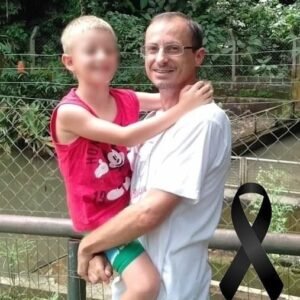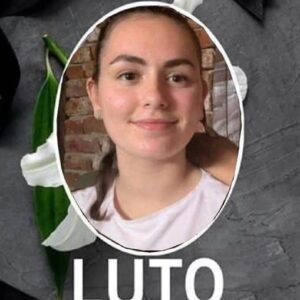“The world would be better off without you,” he whispered — then pushed.
Aaron Whitmore stood behind his wheelchair-bound mother, staring out at the glittering ocean that stretched endlessly beyond the cliffs. From a distance, they looked like a loving mother and son spending a peaceful afternoon by the sea. But inside Aaron’s mind, dark thoughts churned.
For five long years, his mother, Helen Whitmore, had been paralyzed after a terrible car accident. Once a strong, respected woman who had built her husband’s business empire alongside him, she was now frail, dependent, and confined to a wheelchair. Her condition demanded constant care, endless hospital visits, and emotional strain.
After his father’s death, Aaron inherited the family company — and all the responsibilities that came with it. But Helen still held the controlling shares. Every major decision required her approval, and she never hesitated to criticize his choices. To Aaron, she had become a burden — a constant reminder of the past he wanted to escape.
That afternoon, Helen sat quietly, gazing at the sea, her loyal golden retriever, Max, resting by her side. The waves crashed below, and the wind carried the scent of salt and seaweed. Aaron had brought her here many times before. But today was different. Today, he had a plan.
He pretended to adjust her blanket, his expression calm and loving. “It’s cold up here, Mom,” he said softly.
Helen smiled faintly. “You’ve always looked after me, Aaron. Your father would be proud.”
Those words pierced his heart, but his greed silenced the guilt. “You have no idea, Mom,” he muttered under his breath. Then, in a single motion, he gripped the handles of her wheelchair and pushed — hard.
The wheels rolled forward. Helen gasped, her trembling hands clutching the armrests. “Aaron! What are you—?”
Her scream was cut off by the wind as her body disappeared over the edge.
Aaron froze, his heart pounding. Then silence. Only the sea roared below.
Max began barking wildly, racing toward the cliff, tail whipping in panic. Aaron stepped back, trembling but resolute. “It’s done,” he whispered. “It’s finally done.”
He turned away, leaving the loyal dog barking into the wind, calling for the woman who would never answer again.
The police concluded it was an accident. A tragic misstep by a frail woman in a wheelchair near a steep cliff. Aaron played the grieving son perfectly — tears at the funeral, trembling voice during interviews, generous donations in his mother’s name. The world sympathized.
But inside, guilt began to rot him from within.
Max refused to leave the cliffside. Every morning, the dog would limp back to that spot, whining, staring out to the sea. No amount of coaxing or shouting could move him for long. Aaron tried to ignore it at first, but the sound of the dog’s cries haunted him.
He stopped sleeping. He stopped eating properly. Even his colleagues noticed his change. His eyes were hollow; his smile, forced. When he looked at himself in the mirror, he no longer saw the ambitious, confident CEO — he saw a murderer.
One night, he found Max scratching furiously at the front door, trying to escape. The dog’s paws were bleeding, but he wouldn’t stop. Aaron lost his temper, shouting, “She’s gone! Do you hear me? She’s gone!” He locked Max outside and slammed the door.
But as he lay in bed that night, he could still hear the faint, heartbreaking whimpers beyond the window.
Days turned into weeks. Max’s health declined. He stopped eating, barely moved, but still crawled toward the cliff whenever he could. And Aaron — despite all his attempts to suppress the guilt — began to feel the crushing weight of what he had done.
The company started falling apart. Investors lost confidence, rumors spread about his erratic behavior. Nothing he did could fix it. Every success turned sour, every smile hollow. And through it all, the image of the cliff haunted him — the moment he pushed, the scream, the silence afterward.
Then, one morning, Max was gone.
Aaron searched the property, calling his name, but there was no trace. A strange emptiness settled in his chest. For the first time, he realized that the only living being who had truly loved him — despite everything — was gone.
A month later, Aaron drove toward the cliffs again, as if drawn by an invisible hand. The sun was setting, painting the ocean in shades of orange and crimson. The wind howled against his face.
When he reached the spot where it had all happened, he froze. There, at the very edge, sat Max — thinner, weaker, but unmistakably alive.
“Max?” Aaron whispered, stepping closer.
The dog lifted his head, eyes dull but alert. He gave a soft bark — not in joy, but in recognition. His tail didn’t wag. He simply stared at Aaron with the same look of confusion and sorrow he had worn that day.
Aaron’s knees buckled. “I’m sorry,” he murmured. “I just wanted… freedom. I didn’t mean—”
The words caught in his throat. The memory of Helen’s voice echoed in his mind: “Your father would be proud.”
He stepped closer, tears streaming down his face. “Max, let’s go home.”
But as he took another step, his foot slipped on the loose gravel. His body lurched forward — and suddenly, he was teetering on the edge. He reached out, grasping for balance, but there was nothing to hold on to.
Max barked sharply, startled, and backed away.
Aaron’s body went over the cliff. For a brief moment, he saw the world flip — the ocean, the rocks, the dying light of the sunset — and then everything vanished.
When the police found his body two days later, they also found Max lying beside the cliff, silent and still, as if guarding the spot where both mother and son had fallen.
Aaron Whitmore’s death was ruled accidental — but for those who knew the story, it was justice.
Because even when no human eye had seen his crime, one heart had remembered.
And that heart had never stopped waiting at the edge of the sea.





